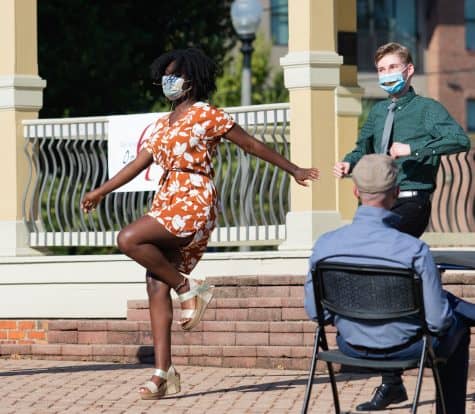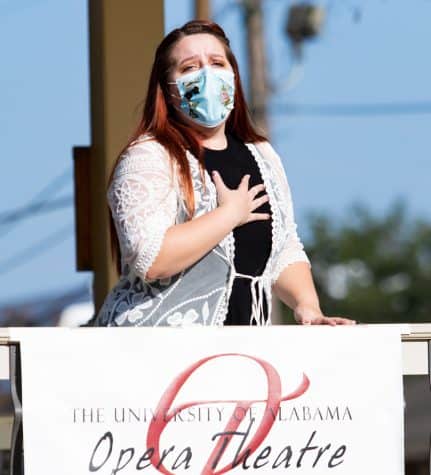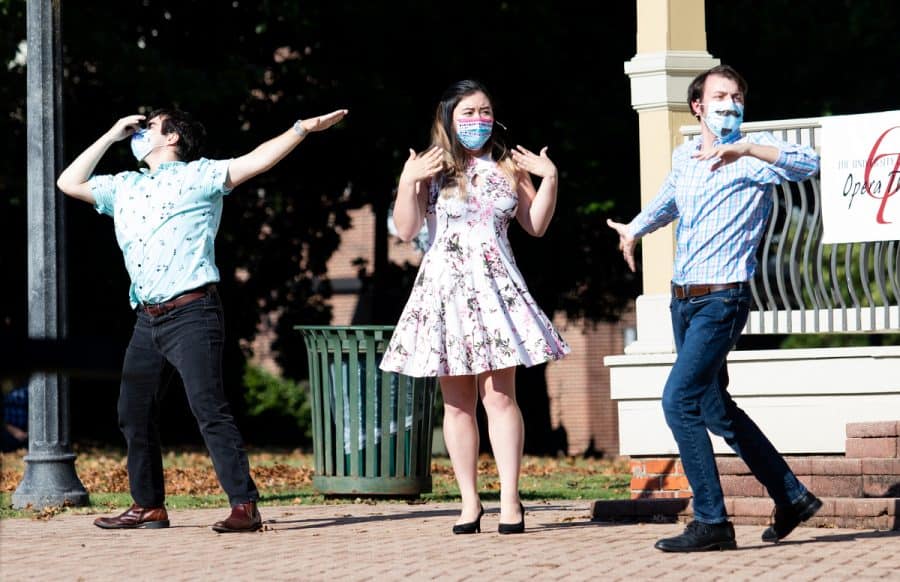Mozart in Masks: UA Opera soars into a new semester
After a long hiatus, the cast is back.
Along Capital Park’s grassy plain, an audience sat patiently on an assortment of lawn chairs and blankets last Sunday as they waited for UA Opera Theatre’s in-person debut.
The program, “Much more than hello: An afternoon of operatic greetings,” was a long-awaited return for UA Opera, which hadn’t held a public performance since late February. While abiding by social distancing guidelines, the audience members peacefully chatted about their days and how long it had been since they’d last seen a performance.
One woman mused about how before venues began to close, she sat in a theater with others, and as the performance went on, “everyone looked around and knew that that would be the last performance they’d see for a while.”

Then Paul Houghtaling, a UA professor and the director of opera, stepped onto a yellow gazebo that would act as a stage for the afternoon. The wait had come to an end.
“We are happy to be here,” Houghtaling said as applause erupted from the audience. “Happy to be singing. We are grateful for the opportunity to do what we do finally in the open air and the sunshine. Thank you all.”
The show was divided into three sections. With each performance, the singers captivated the audience with their captivating voices and pure emotion.
The cast began with three pieces from Mozart. “Cosa mi narri? … Sull’ aria” from “The Marriage of Figaro,” was directed by Susan Williams, an associate director, and performed by Hailey Beard and Jessica Konrad. “Quel casinetto è mio … Là ci darem la mano” from “Don Giovanni,” performed by Maxwell Sahli and Olivia Alarcon, and “Ahi mè. Che cosa avete? … Il core vi dono” from “Così fan tutte,” performed by Evan Fleming and Coco Xu, were both directed by Houghtaling.

The cast then performed pieces from “The Fantasticks,” by Harvey Schmidt, “The Secret Garden” by Lucy Simon and “Patience” by Gilbert and Sullivan – all directed by Houghtaling and performed by Benjamin, Wiggins, Teandra Jackson, Evan Fleming, Joey Lay, Thomas Sagona, Maxwell Sahli, Tate Goldberg, Erin Chatman and Megan Matthews.
Lastly, performers Julia Schwendenmann, Grace Richardson, Laura Pritchard, Chloe Hodges, Maria Jo Phelps, Danielle Noletto, Caleb Ferguson, Mikayla Camp, Matthew Tyree, Zoe Rose Proeber and Elijah William Brown took the stage. They performed pieces from Mark Adamo’s “Little Women,” directed by Susan Williams. They also performed Engelbert Humperdinck’s “Hansel and Gretel,” Giuseppe Verdi’s “Rigoletto” and Giacomo Puccini’s “La bohème,” all directed by Bonita Bunt, an associate director.
Throughout the show, the singers skillfully walked the audience through tales of scheming, seduction, romance and more, while also wearing masks and keeping a respectful distance between themselves.
Along with the nod to modernity with the characters texting in “Ahi mè. Che cosa avete? … Il core vi dono,” some pieces incorporated humorous commentary on the nation’s current situation with the coronavirus. For example, they pretended the reality of the problem had been a bad dream or that masks were just an aesthetic prop used to woo women.
And while the masks, in theory, might have been a problem for the singers, they presented no issue during the performance. The ensembles readily welcomed the masks, with some going as far as decorating them with mustaches or other designs “to add character.”
“I thought [the masks] were going to be a larger issue, but it really wasn’t as bad as I thought it was,” said Caleb Ferguson, a voice graduate teaching assistant and one of the performers. “I was pleasantly surprised.”
Though the masks didn’t hinder their vocal performances, Ferguson said they did make emoting a little difficult.
Nonetheless, the performers commanded the stage with ease and enthusiasm, delivering well-thought-out expressive performances that showcased their dedication to their craft. And through this experience, the Opera Theatre program showcased their commitment to getting back in front of audiences.
“It was a learning experience for all of us, for being the first [live performance] since the pandemic started,” Ferguson said. “I think [it] was exciting, frustrating at times, but definitely the outcome was worth it because just to be outside and perform for people was just a great feeling.”
As the last ensemble finished their piece, Houghtaling took the stage to offer his closing remarks to the audience.
“Thank you, my friends, for being here. We hope this is the first of many opportunities we get to perform for you,” he said. “Whether it’s outside, whether it’s in person, whether it’s live-streamed, it’s a privilege and a pleasure to do what we do. We are The University of Alabama Opera Theatre, and this means so much more than hello.”
Editor’s Note: This story was corrected to include the names of three more members who performed the final pieces of the show.




